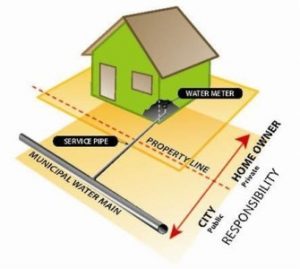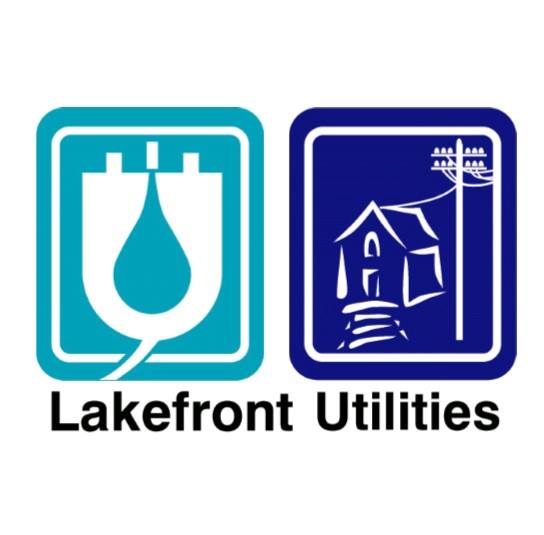SAFETY
Lakefront Utility Services Inc (LUSI) conducts mandatory lead sampling as a requirement of provincial regulations and all samples are analyzed by a certified laboratory. In 2017/2018 there were over 260 random samples tested for lead with the average lead concentration of 0.2 micrograms per litre. The current maximum acceptable concentration, as regulated by the Ontario Drinking Water Standards, is 10 micrograms per litre.
Water produced at the Water Treatment Plant does not contain lead. Lead can be found in
- Water service pipes in homes built before the mid-1950s
- Solder used to join pipes together before 1990
- Leaded-brass fixtures, such as faucets and valves
As these items corrode and breakdown, lead can enter drinking water. LUSI, has replaced all known lead pipe in the municipal drinking water system that is the responsibility of the municipality. However, it is the property owner’s responsibility for all plumbing inside the property line.
 The pictorial illustrates the responsibility of the municipality and the homeowner.
The pictorial illustrates the responsibility of the municipality and the homeowner.
To determine whether you have lead pipes, look at the pipe that goes into your water meter. If it is grey, scratches easily and does not sound hollow when you tap it, it may be lead. A licensed plumber or LUSI operator is the best way to determine if your water service pipe is lead.
If you wish to have your property tested for lead, https://www.ontario.ca/page/laboratories-licensed-test-lead, provides a list of laboratories licensed to test for lead in Ontario. LUSI can also provide lead testing services for a fee of $90.00.
Municipal and Residential Service Line Responsibilities printable
Safety first
The safety of staff and the public is our first priority at Lakefront Utilities.
My water is brown. What do I do?
If your water is discoloured, please flush your pipes as follows:
- Turn on the cold water tap that is closest to your water meter.
- Let it run until the water turns clear. This may take 5-25 minutes.
Please keep in mind that discoloured water is still safe water. Sedimentation (usually iron deposits in the metal pipes) occurs as a normal part of the water distribution system. Activities such as inspecting fire hydrants, operating and maintaining valves, preventative maintenance, and water main breaks may disturb these sediments, which can discolour the water.
Watermain break
If water is gushing onto your street, a water main or water pipe has probably broken on your street. Please call us immediately.
Avoid driving through flooded areas:
- Avoid driving through puddles as they can hide a pothole that could damage your vehicle or its suspension or flatten a tire. The spray of water could obstruct the vision of adjacent motorists and result in a collision, cause harm to nearby pedestrians or drown your engine, causing it to stall. Water can also make your brakes less effective.
- Avoid driving on flooded roads, water may prevent your brakes from working. If you must drive through a flooded stretch of road, test your brakes afterward to dry them out. Test your brakes when it is safe to do so by stopping quickly and firmly at 50 km/h. Make sure the vehicle stops in a straight line, without pulling to one side. The brake pedal should feel firm and secure, not spongy, that’s a sign of trouble. If you still feel a pulling to one side or a spongy brake pedal even after the brakes are dry, you should take the vehicle in for repair immediately.
- Obey road closures and signs and using appropriate detour routes.
LOCATION
207 Division Street
PO Box 577
Cobourg, Ontario
K9A 4L3
Call Us
(905) 372-2193
FAX US
(905) 372-2581
